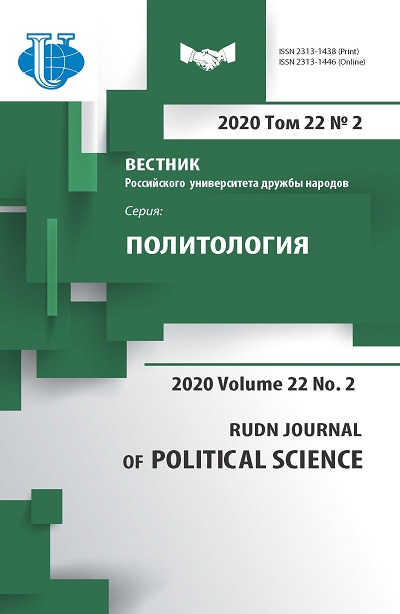Revisionism and Neo-Revisionism in Russian Foreign Policy: Reflecting on the Book by Sakwa R. Russia’s Futures. Polity Press, 2019
- Authors: Kazarinova D.B.1
-
Affiliations:
- Peoples’ Friendship University of Russia (RUDN University)
- Issue: Vol 22, No 2 (2020)
- Pages: 179-193
- Section: GLOBAL DISCURSIVE CONFRONTATION
- URL: https://journals.rudn.ru/political-science/article/view/23645
- DOI: https://doi.org/10.22363/2313-1438-2020-22-2-179-193
Cite item
Full Text
Abstract
This article analyzes the latest book by the British expert on Russian politics R. Sakwa, his key conceptual ideas, key characteristics, contradictions and challenges (between the “stabilocracy” and “securocracy”, incompleteness of modernization and neo-modernization, the letter and spirit of Russian constitutionalism) of modern Russia. We analyze his arguments about the variety of interpretations of the concept of “normality” in relation to Russia as opposed to Western approaches. The contradictions of the New cold war grow into a clash of epistemologies / narratives / discourses / values, in which framing and the accusation of revisionism becomes a tool. We emphasize the fundamental difference in approaches to defining concepts of revisionism and neo-revisionism, trace the dialectic of these concepts from a neo-Marxist understanding to a geopolitical one, generalize the existing definitions, including the understanding of neo-revisionism as an integral attribute of emerging power, which R. Sakwa also adheres to. The revision of history, especially the memory of war, is a powerful propaganda tool for the clash of narratives. In context of development of the “mnemonic security dilemma” (D. Efremenko), the change of the Holocaust narrative to the narrative of the “war of two totalitarianisms” in Europe, Russia should adopt a number of principles for working in the field of historical memory of the Second World War, including new interpretations for the role of China in the victory over fascism.
About the authors
Daria B. Kazarinova
Peoples’ Friendship University of Russia (RUDN University)
Author for correspondence.
Email: kazarinova-db@rudn.ru
PhD in Political Science, Associate Professor of the Department of Comparative Politics
6 Miklukho-Maklaya St, Moscow, 117198, Russian FederationReferences
- Sakwa R. Russia’s Futures. Polity Press, 2019.
- Sakwa R. Putin: Russia’s Choice. Routledge, 2008.
- Entman R.M. Framing: Toward Clarification of a Fractured Paradigm. Journal of Communication. 1993. Vol. 43, Issue 4, December: 51–58. DOI: https://doi.org/10.1111/j.1460-2466.1993.tb01304.x
- Schweller R. Rising Powers and Revisionism in Emerging International Orders. Russia in Global Affairs 7.10.2015. URL: https://eng.globalaffairs.ru/valday/Rising-Powers-and-Revisionism-in-Emerging-International-Orders-17730. Accessed: 02.02.2020.
- Bischof G. The Advent of Neo-Revisionism? Journal of Cold War Studies 2005. Vol. 1. Issue 7: 141–151. doi: 10.1162/1520397053326176
- Dzarasov R., Lane D., Dadabaev T. Russian neo-revisionist strategy and the Eurasian Project. Cambridge Journal of Eurasian Studies. 2017. Vol. 1. URL: https://doi.org/10.22261/3P7NAR
- Rose C. The Sochi Dialogue; A Pathway for Russian Neo-Revisionism in the Levant. The World Mind American University’s undergraduate policy magazine for international and public affairs. URL: https://edspace.american.edu/theworldmind/2018/03/09/1226/. Accessed: 01.02.2020.
- Gribanova G.I. Neorevisionism and the third way. Democracy and governance: Newsletter of the RAPN research Committee on comparative political science (SP-RAPN). SPb., 2007. Vol. 1 (3). (In Russ.).
- Sassoon D. One Hundred Years of Socialism: The West European Left in the Twentieth Century. Palgrave Macmillan, 2010.
- Sakwa R. Russian Neo-Revisionism. Russian Politics. 2019. Vol. 4: Issue 1: 1–21. DOI: https://doi.org/10.1163/2451-8921-00401001 (In Russ.).
- Sakwa R. The Duality of Russia’s foreign policy: neorevisionism and bicontinentalism // Modern Europe. 2015. Vol. 3 (63): 28. DOI: http: //dx.doi.org/10.15211/soverope320152231 (In Russ.).
















